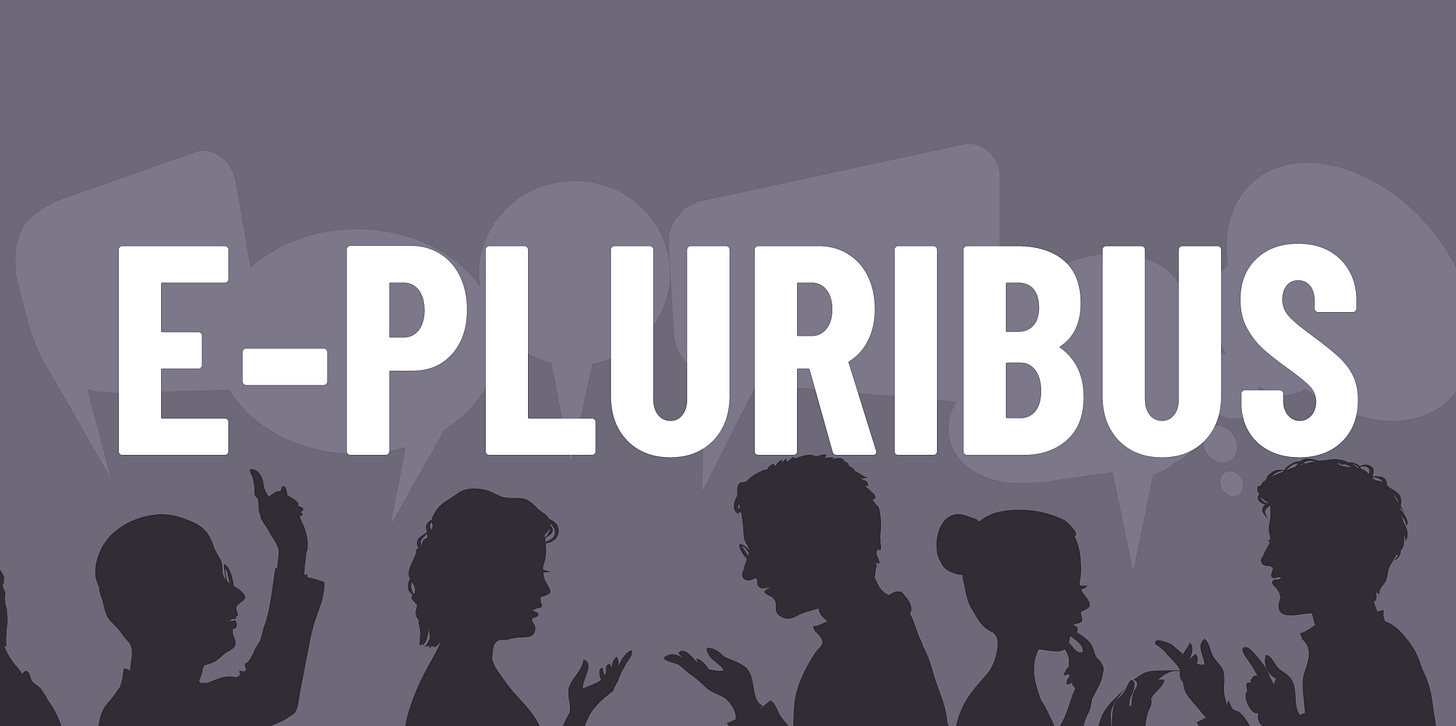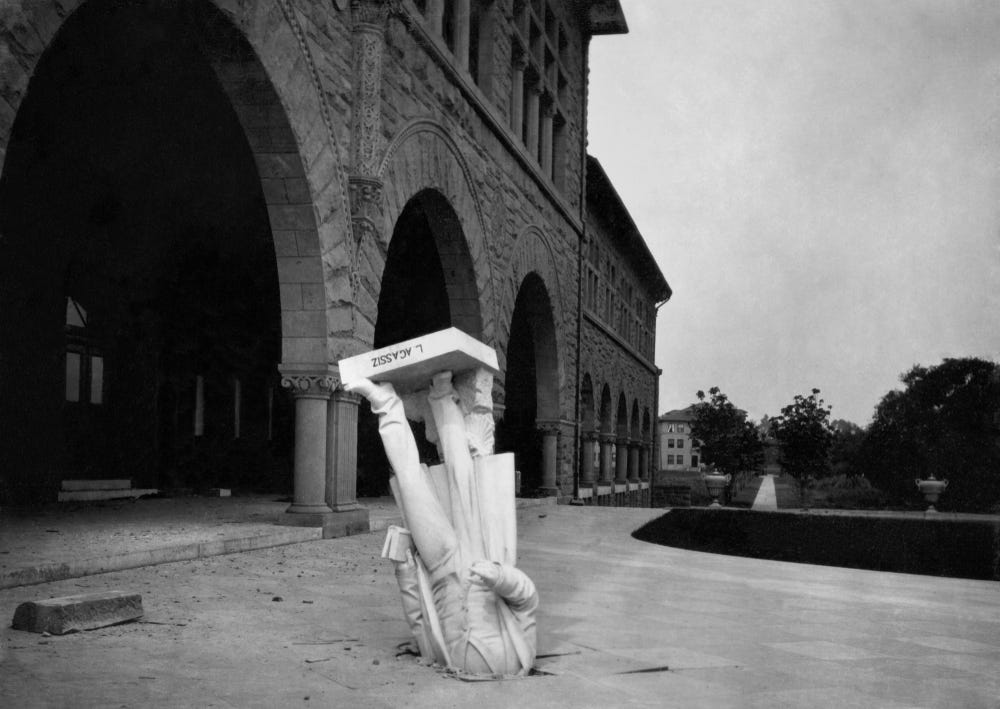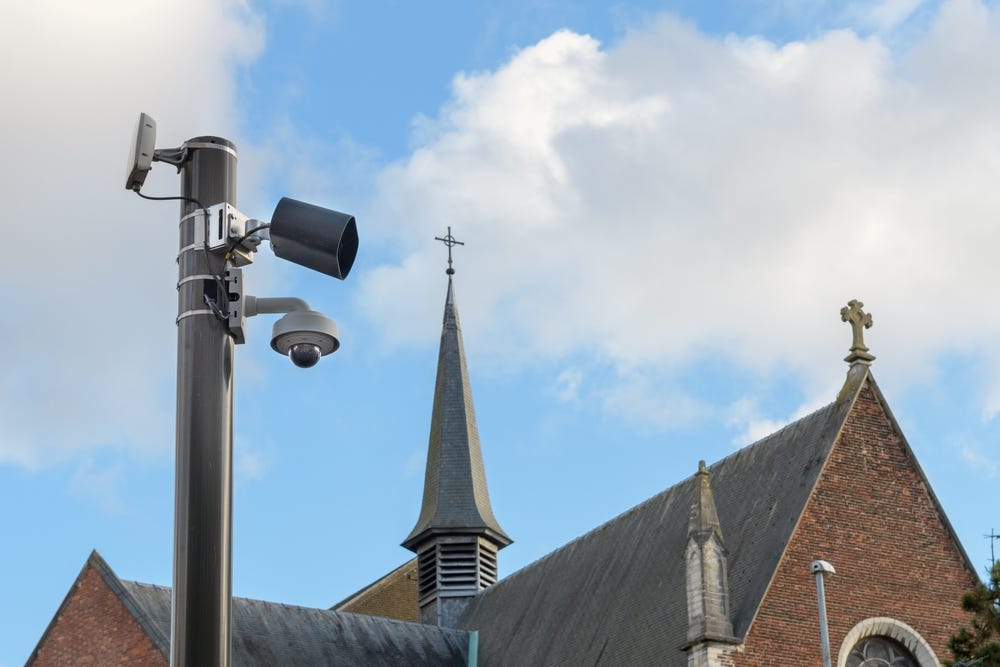E-Pluribus | March 16, 2023
No heroes at Stanford Law, when public health trounces freedom of religion, and could compelled speech in academia be on the way out?
A round-up of the latest and best writing and musings on the rise of illiberalism in the public discourse:
Ken White: Hating Everyone Everywhere All At Once At Stanford
In a recent post, Ken White (a.k.a. Popehat) goes after everyone involved in the Stanford free speech incident. From the way the far-right judge/speaker and right-wing media have used this to promote conservative victimhood to how the Associate Dean told students they’re allowed to shout people down to shut them up, everyone involved deserves ridicule. The full post is worth a read, but here’s a particularly sharp excerpt:
And students. Students think that they should be able to dictate which speakers their peers invite, who can speak, what they can say, and who can listen. They’re not satisfied with the most free-speech-exceptionalist system in the world that lets them respond to speech by assembling, protesting, and reviling people of authority like Judge Duncan. They demand the right not just to speak, but to control the speech of others. That’s straight-up thuggish, an aspiration born of a fascist soul. These are law students. They are training to express themselves for a living. If their view is “we can’t respond to awful speech, we can only stop it from happening,” then they’re going to be terrible lawyers.
Law students also persist in imagining that they invented the world. They believe they discovered that free speech laws and norms protect awful speech and awful people. They believe they discovered the plea “yes, but what you don’t understand is that this speech is really bad.” They believe that they are so self-evidently right, good, trustworthy, and noble that it’s obvious that we should let them decide who talks and who doesn’t. And they are too hubris-swollen — not too stupid, but too drunk with self-righteousness — to see that exceptions to free speech have always been used most harmfully against the powerless, and always will be. They’re too full of themselves to see that “let a crowd decide who is allowed to speak” is a horrific norm to promote with grotesque historic resonance. Some of them will grow out of this.
Finally, they’re law students, and they’re making people stupider about the law: [Image of Posters that read “Counter Speech Is Free Speech.”]
No, you grade-inflated imbeciles. Stanford is a private institution, and normally the First Amendment would not govern it. However, California has Leonard’s Law, a statute requiring private universities to extend the same level of free speech to their students. So you can say that Stanford must obey the First Amendment in disciplining students. And, when they let students put up angry and vituperative fliers, and assemble to protest, and carry signs, and be disrespectful, that’s what they’re doing. However, shouting down is not protected by the First Amendment. Neither is pulling the fire alarm, setting off an airhorn, or making bomb threats to stop the speech from happening. You couldn’t pass a law that said “no shouting down conservative speakers” or “no shouting down political speakers,” because those wouldn’t be content-neutral, but you can absolutely prohibit disrupting someone else’s exercise of free speech so long as you do so in a content-neutral way.
Read it all.
Heather Robinson: A Church. The State. And a Holy War.
How should the government balance freedom of religion with the protection of public health? At The Free Press, Heather Robinson chronicles how a California county went to excessive lengths to spy on a Silicon Valley church when it refused to shut down during COVID lockdowns.
First, in August 2020, another church next door gave the state permission to let enforcement officers spy on Calvary’s faithful through a chain-link fence on its property, according to a recent article by science journalist David Zweig.
Through that fence, for at least three months, agents surveilled the church. They then docked the church for everything from parking lot attendants’ failures to wear face masks outdoors to churchgoers’ refusal to socially distance—by hugging. Officials also counted cars in Calvary’s parking lot each day to estimate how many members were inside.
[ . . . ]
According to Zweig’s piece, Santa Clara County hired the company SafeGraph, which “aggregates information from 47 million mobile devices across the United States,” to set up a virtual perimeter around Calvary Chapel’s property, allowing GPS to track exactly where churchgoers were congregating. Daniel Ho, a Stanford law professor and expert in public health data analysis, was allegedly hired for $800 an hour to analyze the results of the SafeGraph data, Zweig reports. (Officials who monitored the church were paid $219 per hour.)
SafeGraph’s data is supposed to be anonymized, but human rights attorney and information law specialist Irina Tsukerman said that using digital surveillance could mean a potentially serious violation of civil liberties.
Read the full piece.
Erec Smith: Is the Tide Turning on Compelled Speech in Academia?
In February, the University of North Carolina Board of Governors unanimously approved a ban on schools compelling current or potential employees to agree with a particular political viewpoint (i.e., diversity statements) as a condition of their employment. At the Cato At Liberty blog, Erec Smith, Associate Professor of Rhetoric at York College of Pennsylvania, weighs in on the practice and expresses some cautious optimism.
As someone who is left‐of‐center but against the political and educational manifestations of critical social justice, I see this as a step in the right direction. However, part of me thinks this move by UNC may have traded one problem for another. The problem with diversity statements, for instance, is not their existence, per se, but the nature of their existence. It has become clear that, regarding many of these statements, only one kind of answer is acceptable; the answer has to align with the tenets of Critical Social Justice and/or other critical theories, most saliently the tenets that racism is always already going on, that institutional structures are the sole cause of racial disparities, and that the oppressor/oppressed dichotomy is always at play regarding interactions between white people and minorities, especially black minorities. What’s more, around the country, colleges insist they can ask for diversity statements without compelling speech, but one can infer from the advice given on how to compose a diversity statement, like that given by University of Pennsylvania, Massachusetts Institute of Technology, and even UNC, that a certain kind of person is being sought: a person who has DEI as a veritable area of specialization or, at least, a salient area of competence. The fact that DEI statements written by Frederick Douglass, Zora Neale Hurston, and other legends of racial justice could be rejected by some of the more “woke” hiring committees as too “white” is the real travesty. Would it have been enough to mandate that a variety of viewpoints on DEI be accepted?
Also, I don’t think it is inherently unjust to ask candidates what they can contribute to diversity, equity, and inclusion; it just shouldn’t be a mandatory consideration for hiring. Requiring applicants to respond to what amounts to a litmus test on one’s political leanings should be discouraged, but would a paragraph in an otherwise traditional cover letter describing one’s thoughts on racial justice be acceptable? What if a full diversity statement is requested but not required? This can get tricky in other ways. How is the Board of Governors defining terms like “political” or even “diversity”, “equity,” or “inclusion”? What is beyond the pale? For example, if a committee sees two very comparable job applications, but one applicant has experience with social justice initiatives, would it be wrong to choose the latter candidate over the former for that reason, all else being equal?
There does seem to be a kind of loophole in UNC’s new policy. Apparently, if hiring committees believe a diversity statement is imperative to a particular job, they must “obtain prior written approval to include such a requirement or solicitation from the President following discussion in open session of a meeting of the Committee on University Governance attended by the requesting constituent institution’s chancellor, its provost, and its chair of its board of trustees.” This addresses part of the issue, but the devil is still in the details. Again, operational definitions of diversity, equity, inclusion, etc. would need to be established. Also, the Committee on University Governance needs to be staffed by good‐faith actors and those who can tell the difference between classic civil rights and contemporary “woke” social justice. That last statement leads to what may be the ultimate question: how thin is the line between UNC’s new policy and the all out attack on DEI indicative of the political maneuvering of people like Ron Desantis, who has been accused of going too far in his battle against “woke” politics?
Read the full post.
Around Twitter
A Pennsylvania state legislator called for a public university to cancel a speaker for being “transphobic”:
FIRE with an update on Florida’s Stop WOKE Act
More definitions of “woke”:










